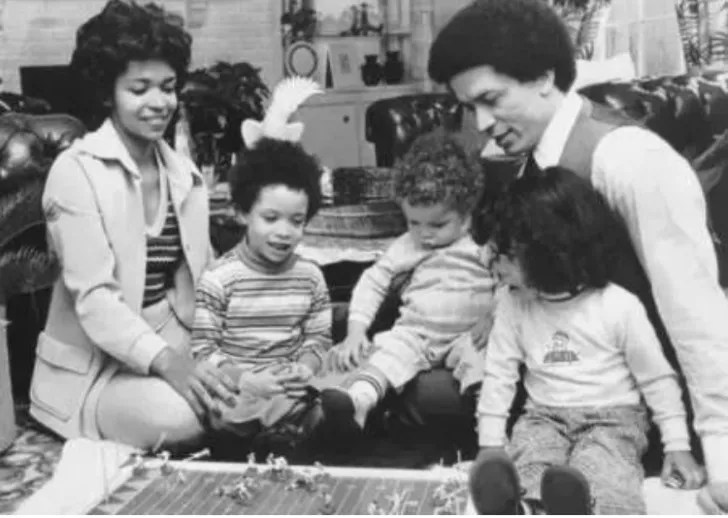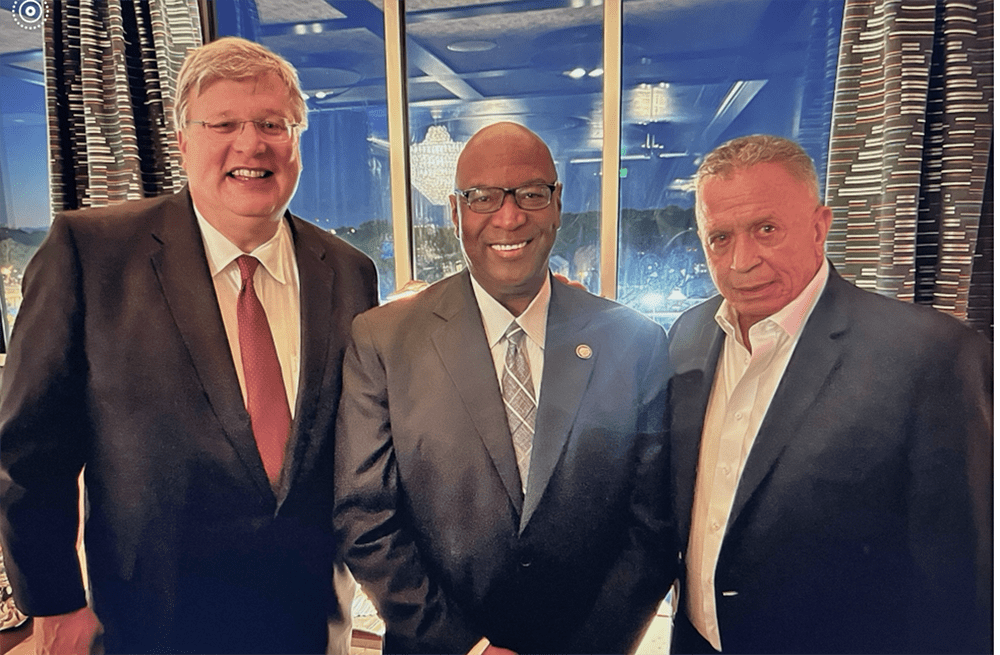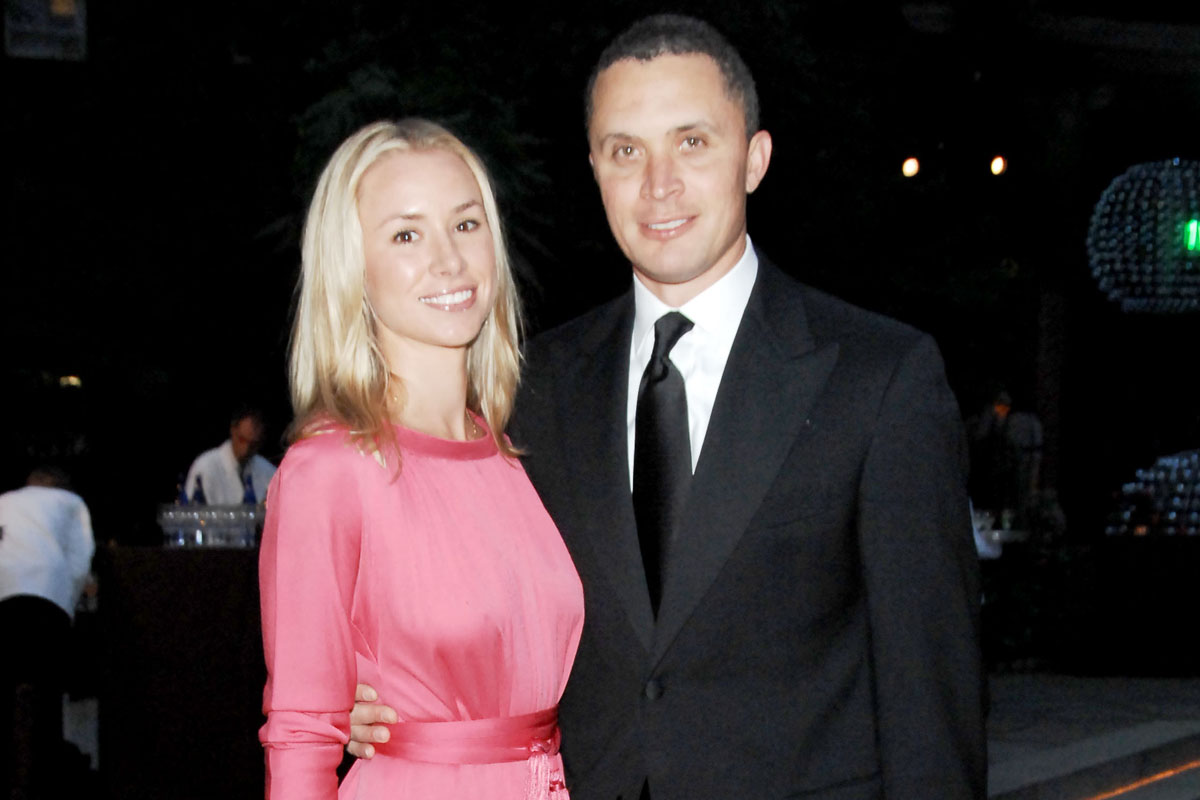Harold Ford Sr.'s second wife was Dorothy Bowles, a prominent civil rights activist and the daughter of civil rights leader Asa Philip Randolph. They married in 1967 and remained together until Ford's death in 2000.
Dorothy Bowles Ford was a tireless advocate for civil rights and social justice. She worked closely with her husband on many of his political campaigns and was a strong supporter of his work. She was also a vocal critic of racism and discrimination and worked to promote equality and understanding among all people.
Harold Ford Sr. was a prominent politician and civil rights leader. He served in the US House of Representatives from 1975 to 1997 and was a strong advocate for civil rights and social justice. He was also a close friend and ally of Dr. Martin Luther King Jr.
harold ford sr second wife
Harold Ford Sr.'s second wife, Dorothy Bowles Ford, was a prominent civil rights activist and the daughter of civil rights leader Asa Philip Randolph. She was a tireless advocate for civil rights and social justice, and worked closely with her husband on many of his political campaigns.
- Advocate for civil rights
- Promoter of equality
- Supporter of her husband's work
- Daughter of a civil rights leader
- Wife of a prominent politician
- Close friend of Martin Luther King Jr.
- Tireless worker for social justice
- Inspiration to many
Dorothy Bowles Ford was a remarkable woman who dedicated her life to fighting for civil rights and social justice. She was a strong and courageous advocate for equality, and her work made a real difference in the lives of many people. She is an inspiration to us all.
Advocate for civil rights
Dorothy Bowles Ford, the second wife of Harold Ford Sr., was a prominent civil rights activist. She was the daughter of civil rights leader Asa Philip Randolph, and she worked closely with her husband on many of his political campaigns.
- Fighting for equality
Dorothy Bowles Ford was a strong advocate for equality. She worked to end discrimination in all its forms, and she fought for the rights of all Americans, regardless of race, religion, or gender.
- Promoting social justice
Dorothy Bowles Ford was also a passionate advocate for social justice. She worked to improve the lives of all Americans, and she fought for policies that would benefit the poor, the working class, and the middle class.
- Inspiring others
Dorothy Bowles Ford was an inspiration to many. She showed that one person can make a difference in the world, and she encouraged others to get involved in the fight for civil rights and social justice.
Dorothy Bowles Ford was a remarkable woman who dedicated her life to fighting for civil rights and social justice. She was a strong and courageous advocate for equality, and her work made a real difference in the lives of many people. She is an inspiration to us all.
Promoter of equality
Dorothy Bowles Ford, the second wife of Harold Ford Sr., was a prominent civil rights activist and a strong advocate for equality. She worked to end discrimination in all its forms, and she fought for the rights of all Americans, regardless of race, religion, or gender.
- Fighting for voting rights
Dorothy Bowles Ford was a tireless advocate for voting rights. She worked to ensure that all Americans had the right to vote, and she fought against voter suppression efforts. She believed that everyone should have a voice in our democracy, and she worked to make that a reality.
- Promoting equal opportunity
Dorothy Bowles Ford also worked to promote equal opportunity for all Americans. She fought for equal access to education, housing, and employment. She believed that everyone should have the opportunity to succeed, regardless of their background.
- Challenging discrimination
Dorothy Bowles Ford was a vocal critic of discrimination. She spoke out against racism, sexism, and all forms of bigotry. She challenged the status quo and fought to create a more just and equitable society.
Dorothy Bowles Ford's work as a promoter of equality made a real difference in the lives of many people. She was a strong and courageous advocate for justice, and her legacy continues to inspire us today.
Supporter of her husband's work
Dorothy Bowles Ford, the second wife of Harold Ford Sr., was a prominent civil rights activist and a strong supporter of her husband's work. She was a tireless advocate for civil rights and social justice, and she worked closely with her husband on many of his political campaigns.
Dorothy Bowles Ford's support for her husband's work was essential to his success. She was a trusted advisor and confidante, and she provided him with unwavering emotional support. She also played an active role in his campaigns, organizing events, fundraising, and speaking on his behalf. Her support helped him to build a strong base of support and to win elections.
In addition to her support for her husband's political career, Dorothy Bowles Ford was also a strong advocate for civil rights and social justice in her own right. She worked to improve the lives of all Americans, regardless of race, religion, or gender. She was a tireless fighter for equality and justice, and her work made a real difference in the world.
Dorothy Bowles Ford was a remarkable woman who dedicated her life to fighting for civil rights and social justice. She was a strong and courageous advocate for equality, and her work made a real difference in the lives of many people. She is an inspiration to us all.
Daughter of a civil rights leader
Dorothy Bowles Ford, the second wife of Harold Ford Sr., was the daughter of civil rights leader Asa Philip Randolph. This connection is significant because it influenced her upbringing, values, and commitment to social justice.
- Exposure to civil rights activism
Growing up in a household led by a prominent civil rights leader, Dorothy Bowles Ford was exposed to the fight for equality and justice from a young age. She witnessed firsthand the challenges and triumphs of the civil rights movement and developed a deep understanding of the issues facing African Americans.
- Commitment to social justice
Dorothy Bowles Ford's upbringing instilled in her a strong commitment to social justice. She believed that all people deserved equal rights and opportunities, regardless of their race, religion, or gender. This commitment shaped her work as a civil rights activist and advocate for the poor and working class.
- Political influence
Dorothy Bowles Ford's father, Asa Philip Randolph, was a close friend and advisor to Harold Ford Sr. This connection gave Dorothy Bowles Ford access to political leaders and influencers, which she used to further her own work on civil rights and social justice.
In conclusion, Dorothy Bowles Ford's connection to her father, a civil rights leader, had a profound impact on her life and work. It shaped her values, commitment to social justice, and political influence, enabling her to make a significant contribution to the fight for equality and justice.
Wife of a prominent politician
Dorothy Bowles Ford, the second wife of Harold Ford Sr., was a prominent civil rights activist and a strong supporter of her husband's political career. She was a tireless advocate for equality and justice, and her work made a real difference in the lives of many people.
- Political influence
As the wife of a prominent politician, Dorothy Bowles Ford had access to political leaders and influencers. She used this influence to further her own work on civil rights and social justice. For example, she worked with her husband to pass legislation that expanded voting rights and improved access to education and housing for African Americans.
- Public platform
Dorothy Bowles Ford's position as the wife of a prominent politician gave her a public platform to speak out on issues that she cared about. She used this platform to raise awareness of civil rights issues and to challenge discrimination and inequality.
- Role model
Dorothy Bowles Ford was a role model for many African American women. She showed that it was possible to be a successful wife, mother, and activist. She also showed that African American women could make a real difference in the world.
Dorothy Bowles Ford's work as the wife of a prominent politician was essential to her success as a civil rights activist. She used her influence, platform, and role model status to make a real difference in the lives of many people.
Close friend of Martin Luther King Jr.
Dorothy Bowles Ford, the second wife of Harold Ford Sr., was a close friend of Martin Luther King Jr. This connection is significant because it influenced her activism and her work for civil rights.
Dorothy Bowles Ford first met Martin Luther King Jr. in the early 1960s. They quickly became close friends and allies in the fight for civil rights. Dorothy Bowles Ford was inspired by King's leadership and his commitment to nonviolent resistance. She worked closely with King on many of his campaigns, including the March on Washington for Jobs and Freedom in 1963.
Dorothy Bowles Ford's friendship with Martin Luther King Jr. had a profound impact on her life and work. She learned from his example and his teachings, and she carried his legacy forward in her own work for civil rights and social justice.
Tireless worker for social justice
Dorothy Bowles Ford, the second wife of Harold Ford Sr., was a tireless worker for social justice. She was a strong advocate for civil rights and equality, and she worked to improve the lives of all Americans. Her work was essential to the success of the civil rights movement, and her legacy continues to inspire activists today.
Dorothy Bowles Ford was born in New York City in 1924. Her father, Asa Philip Randolph, was a prominent civil rights leader, and her mother, Lillian, was a social worker. Dorothy Bowles Ford grew up in a household that was dedicated to fighting for justice and equality. She attended Howard University, where she studied sociology and social work. After graduating from Howard, Dorothy Bowles Ford worked as a social worker in New York City. She also became active in the civil rights movement, and she worked with her father on many of his campaigns.
In 1967, Dorothy Bowles Ford married Harold Ford Sr., a prominent civil rights leader and politician. Together, they had two children. Dorothy Bowles Ford continued to work for social justice throughout her life. She served on the boards of several civil rights organizations, and she was a vocal advocate for voting rights, equal opportunity, and affordable housing. Dorothy Bowles Ford died in 2009, but her legacy continues to inspire activists today.
Inspiration to many
Dorothy Bowles Ford, the second wife of Harold Ford Sr., was an inspiration to many people. She was a strong and courageous advocate for civil rights and social justice, and her work made a real difference in the lives of many people. She was also a role model for many African American women, showing that it was possible to be a successful wife, mother, and activist.
- Advocate for civil rights
Dorothy Bowles Ford was a tireless advocate for civil rights. She worked to end discrimination in all its forms, and she fought for the rights of all Americans, regardless of race, religion, or gender. She was an inspiration to many people who were fighting for the same cause, and her work helped to make the civil rights movement a success.
- Role model for women
Dorothy Bowles Ford was also a role model for many African American women. She showed that it was possible to be a successful wife, mother, and activist. She was an inspiration to many women who were struggling to find their place in the world, and her work helped to pave the way for future generations of African American women.
- Inspiration to young people
Dorothy Bowles Ford was also an inspiration to many young people. She showed that it was possible to make a difference in the world, even if you are young. She was an inspiration to many young people who were looking for ways to get involved in the civil rights movement, and her work helped to inspire a new generation of activists.
Dorothy Bowles Ford was a remarkable woman who inspired many people. Her work for civil rights and social justice made a real difference in the world, and her legacy continues to inspire people today.
FAQs on Harold Ford Sr.'s Second Wife
This section provides answers to frequently asked questions about Dorothy Bowles Ford, the second wife of Harold Ford Sr., a prominent civil rights leader and politician.
Question 1: Who was Dorothy Bowles Ford?
Answer: Dorothy Bowles Ford was a civil rights activist and the daughter of civil rights leader Asa Philip Randolph. She was a strong advocate for equality and justice, and she worked closely with her husband on many of his political campaigns.
Question 2: What was Dorothy Bowles Ford's role in the civil rights movement?
Answer: Dorothy Bowles Ford was a tireless advocate for civil rights. She worked to end discrimination in all its forms, and she fought for the rights of all Americans, regardless of race, religion, or gender. She was a close friend and ally of Martin Luther King Jr., and she worked with him on many of his campaigns.
Question 3: What was Dorothy Bowles Ford's relationship with Harold Ford Sr.?
Answer: Dorothy Bowles Ford married Harold Ford Sr. in 1967. They had two children together. Dorothy Bowles Ford was a strong supporter of her husband's political career, and she worked closely with him on many of his campaigns.
Question 4: What was Dorothy Bowles Ford's legacy?
Answer: Dorothy Bowles Ford was a remarkable woman who dedicated her life to fighting for civil rights and social justice. She was a strong and courageous advocate for equality, and her work made a real difference in the lives of many people. She is an inspiration to us all.
Question 5: How can I learn more about Dorothy Bowles Ford?
Answer: There are many resources available to learn more about Dorothy Bowles Ford. You can read her biography, watch documentaries about her life, and visit museums thats her work.
Question 6: What can I do to carry on Dorothy Bowles Ford's legacy?
Answer: The best way to carry on Dorothy Bowles Ford's legacy is to continue to fight for the causes that she cared about. You can work to end discrimination, promote equality, and fight for social justice. You can also support organizations that are working to make the world a better place.
Dorothy Bowles Ford was a remarkable woman who made a real difference in the world. Her legacy continues to inspire us today.
Transition to the next article section:
This concludes our FAQs on Harold Ford Sr.'s second wife. For more information on the civil rights movement, please see the next section.
Tips Inspired by Harold Ford Sr.'s Second Wife, Dorothy Bowles Ford
Dorothy Bowles Ford, the second wife of civil rights leader Harold Ford Sr., was a tireless advocate for civil rights and social justice. Here are a few tips inspired by her life and work:
Tip 1: Be a strong advocate for what you believe in. Dorothy Bowles Ford was never afraid to speak out against injustice. She used her voice and platform to fight for the rights of all Americans, regardless of their race, religion, or gender.
Tip 2: Work with others to achieve your goals. Dorothy Bowles Ford knew that she could not achieve her goals alone. She worked closely with her husband, Harold Ford Sr., and other civil rights leaders to fight for change.
Tip 3: Be persistent. The fight for civil rights was long and difficult, but Dorothy Bowles Ford never gave up. She continued to work for change, even when it seemed impossible.
Tip 4: Be courageous. Dorothy Bowles Ford faced many challenges in her life, but she never let fear stop her from fighting for what she believed in.
Tip 5: Be an inspiration to others. Dorothy Bowles Ford was a role model for many people. She showed that it is possible to make a difference in the world, even if you are just one person.
Summary of key takeaways or benefits:
- By following these tips, you can make a positive impact on your community and the world.
- You can be a strong advocate for what you believe in, work with others to achieve your goals, be persistent, be courageous, and be an inspiration to others.
Transition to the article's conclusion:
Dorothy Bowles Ford was a remarkable woman who dedicated her life to fighting for civil rights and social justice. Her legacy continues to inspire us today.
Conclusion
Dorothy Bowles Ford, the second wife of Harold Ford Sr., was a remarkable woman who dedicated her life to fighting for civil rights and social justice. She was a strong advocate for equality and justice, and her work made a real difference in the lives of many people.
Dorothy Bowles Ford's legacy continues to inspire us today. She showed us that one person can make a difference in the world. She also showed us the importance of fighting for what we believe in, even when it is difficult. Dorothy Bowles Ford was a true pioneer, and her work helped to make the world a better place.
We can all learn from Dorothy Bowles Ford's example. We can all be strong advocates for what we believe in. We can all work together to make the world a better place.
Unveiling The Cosmic Blueprint: Jaren Lewison's Astrological Journey
Unveiling Yordenis Ugas's Net Worth: Secrets And Surprises Revealed
Uncover The Secrets Of Trinity Morisette's Net Worth: A StyleSavvy Guide



ncG1vNJzZmisn6XAc36NmqSsa16Ztqi105qjqJuVlru0vMCcnKxmk6S6cLTAq6alnF2bvLOwjKypZquVmLyvsIywoJ%2BdXp3Brrg%3D